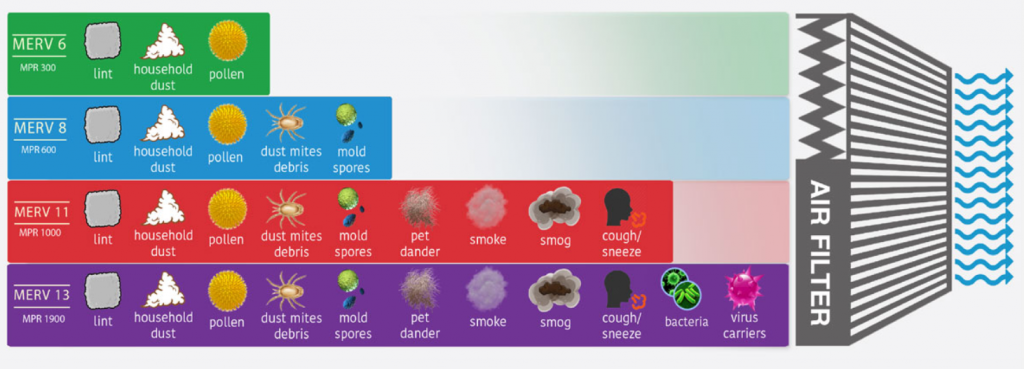Keeping your HVAC breathing through the Covid-19 pandemic.
The United States continues the fight against COVID-19, many reopened businesses are concerned about indoor air quality. As a result, new requirements are being implemented for the public’s safety.
Recently, New York allowed for the reopening of shopping malls but with a mandate from Gov. Andrew Cuomo: Update HVAC filters with at least a MERV-11 rating to capture the potentially airborne coronavirus particles. Likewise, Colorado’s Denver Public Schools unanimously approved Denver schools to get ventilation upgrades to help stem the spread of coronavirus. So what do these guidelines mean, and could other states follow these policies?
HVAC Filters
Minimum Efficiency Reporting Value (MERV) is used to measure the effectiveness of air filters on a scale of 1 to 16. The higher the MERV rating, the greater the filtration, i.e. the smaller the particles it can catch. The Centers for Disease Control and Prevention (CDC) recommends to improve central air filtration to the MERV-13 level (or the highest compatible with the filter rack) and to seal edges of the filter to limit bypass.

However, updating an HVAC system’s air filters may not be as simple as it sounds. For instance, a common factor that will get overlooked is that most HVAC systems that were designed for lower MERV filters (likely most of them) will need to be rebalanced for the new filters. The higher the MERV rating, the better the filtration but also the higher the static pressure (or resistance) that the fan must work against, resulting in a drop in airflow. The reduced airflow could cause comfort problems and even frozen coils. To prevent these issues, the airflow will need to be measured with the new filters installed, and then the fan speed will need to be increased to achieve the designed airflow.
Yet this is still not a “one size fits all” solution for all. Many HVAC units cannot handle the higher-rated filters. Using a filter with a higher MERV rating may cause the motor to burn out. This is why it is important you have a trained technician review your unit before making any changes.
Other Building Ventilation Recommendations
In addition to replacing filters, ASHRAE recommends the following actions, with the ultimate goal being consistent and frequent air changes:
- Increase outdoor air ventilation (use caution in highly polluted areas); with a lower population in the building, this increases the effective ventilation per person.
- Open minimum outdoor air dampers, as high as 100%, thus eliminating recirculation. (During mild weather, thermal comfort or humidity within a facility normally wouldn’t be affected. During extreme weather, this clearly becomes more difficult to control.)
- Consider portable room air cleaners with HEPA filters.
- Consider Ultraviolet Germicidal Irradiation (UVGI), protecting occupants from radiation, which is particularly in high-risk spaces such as waiting rooms, prisons and shelters.
Developing Solutions
While the experts are recommending the above items, they are not mandatory across the country. States’ policies vary. Not to mention that COVID-19 research is still developing.

The result, in the near term, is likely to be a patchwork — some commercial buildings, schools, colleges, and other facilities will make investments, while others will not. One example of an organization making the investment to fight COVID-19 is KIPP DC, a publicly funded and privately operated network of seven school campuses with 1,200 employees and 7,000 students. KIPP DC has taken huge measures, working to find the ideal system optimized to filter the coronavirus.

KIPP DC’s Coronavirus Filter System (Source)
Hire Melink to Help
Overwhelmed and not sure where to begin? Melink employs a 100% self-performing, NEBB-Certified national network of Test and Balance (T&B) HVAC technicians that can quickly deploy to assess mechanical systems, verify airflow rates in accordance with ASHRAE 62.1 standards, and perform any traditional T&B work.
We have multiple, long-standing relationships with some of the largest national restaurant, retail, hotel, and supermarket chains. These relationships began because those partners liked the idea of having just one third-party company to coordinate. Melink handles all their properties by objectively verifying that the HVAC systems were installed and are working as expected.
We are here to help you navigate the ever-changing recommendations and regulations of the pandemic. Let us help you keep your doors open while helping protect your employees, customers, and equipment. Contact us.
